英语语法省略
英语语法中的省略现象
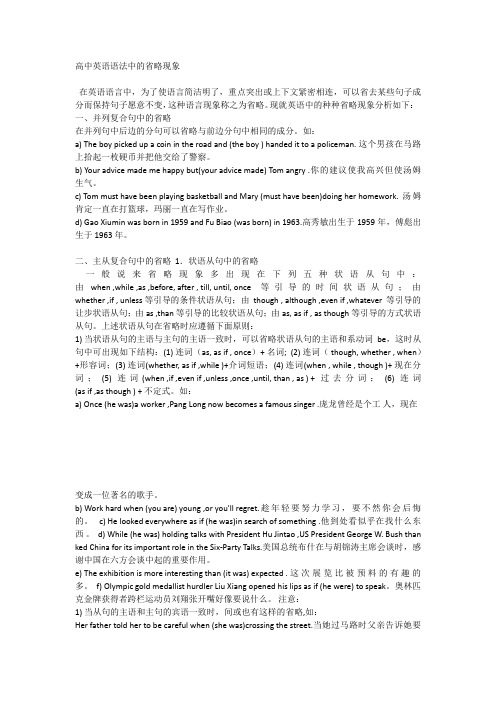
高中英语语法中的省略现象在英语语言中,为了使语言简洁明了,重点突出或上下文紧密相连,可以省去某些句子成分而保持句子愿意不变,这种语言现象称之为省略。
现就英语中的种种省略现象分析如下:一、并列复合句中的省略在并列句中后边的分句可以省略与前边分句中相同的成分。
如:a) The boy picked up a coin in the road and (the boy ) handed it to a policeman. 这个男孩在马路上拾起一枚硬币并把他交给了警察。
b) Your advice made me happy but(your advice made) Tom angry .你的建议使我高兴但使汤姆生气。
c) Tom must have been playing basketball and Mary (must have been)doing her homework. 汤姆肯定一直在打篮球,玛丽一直在写作业。
d) Gao Xiumin was born in 1959 and Fu Biao (was born) in 1963.高秀敏出生于1959年,傅彪出生于1963年。
二、主从复合句中的省略 1.状语从句中的省略一般说来省略现象多出现在下列五种状语从句中:由 when ,while ,as ,before, after , till, until, once等引导的时间状语从句;由whether ,if , unless 等引导的条件状语从句;由though , although ,even if ,whatever等引导的让步状语从句;由 as ,than 等引导的比较状语从句;由as, as if , as though 等引导的方式状语从句。
上述状语从句在省略时应遵循下面原则:1) 当状语从句的主语与主句的主语一致时,可以省略状语从句的主语和系动词be,这时从句中可出现如下结构:(1) 连词(as, as if , once)+ 名词; (2) 连词( though, whether , when)+形容词;(3) 连词(whether, as if ,while )+介词短语;(4) 连词(when , while , though )+ 现在分词; (5) 连词(when ,if ,even if ,unless ,once ,until, than , as ) + 过去分词; (6) 连词(as if ,as though ) + 不定式。
英语语法中的省略有哪些

英语语法中的省略有哪些英语是按照分布面积而言最流行的语言,但母语者数量是世界第三,仅次于汉语、西班牙语。
它是学习最广泛的第二语言,是近60个主权国家的官方语言或官方语言之一。
下面是店铺为大家收集的英语语法中的省略有哪些,欢迎阅读,希望大家能够喜欢。
英语语法中的省略有哪些一、并列复合句中某些相同成分的省略。
二、在when,while,if,asif,though(或although),as,until,once,whether,unless,where等连词连接的状语从句中,常省略跟主句相同的主语和be动词。
三、当见到“when(或if,where,wherever,whenever,assoonas,asfastas,than等)+possible/necessary等”时,可理解中间省略了itis(或was)。
四、有形式主语it的主语从句可省略that。
五、在限制性定语从句中可省略作宾语的关系代词whom,which,that。
六、在direction(方向),way(方式),distance(距离),time(时间),times(倍数)等后面所接的定语从句中常省略that,which,inwhich。
七、以therebe开头的句子,其主语的定语从句常可省略关联词,而therebe结构作定语从句时,省略作主语的关系代词。
八、命令句、惊叹句、部分第一人称的陈述句、部分问句和答句中省略最为常见。
九、用so,not或其它手段来省略上文或问句中的'一部分或整个句义。
小升初英语语法省略句知识点1. 省略句的定义省略是为了避免重复、突出新信息并使上下文紧密连接的一种语法修辞手段。
省略在语言中,尤其在对话中,是一种十分普遍的现象。
2.小品词的省略1)省略介词I ‘ ve studied English (for) five years. 我已学五年英语了。
2)省略连词thatI believe (that) you will succeed . 我相信你们会成功的。
英语语法19之省略

三、其他句型中的省略
1.“It be/I am等 + 名词或形容词(+从句)”结构中,重点在后面的内容,因此 前面主语和系动词常省略。 举例:(It is a) pity (that) you missed the film last night.
(It was) Lucy enough for me to have found the right way in the end. 2.主语补语或宾语补语中的to be往往省略。 举例:These instruments are thought (to be) very important.
All our cadres,whatever their rank (may be),are servants of the people. 6.虚拟语气中should或连词if的省略 举例:He ordered that everything (should) be ready before beginning the test.
英语语法省略句

省略句1)不定式在love, mean, want, like, wish, expect, try, intend, plan, refuse, prefer, seem等动词后面2)在happy,glad,eager,ready,willing等形容词后面。
1.---will you join us?--- I should love to(join you).2.I asked him to see the fil m, but he didn’t want to(see the film).3.--- Would you like to go with us?--- Yes, I’m glad to(go with you)4.He doesn’t get up early as he used to. (get up)注意: 如果不定式中含有be, have(助动词), have been, 通常保留be, have(助动词), have been.1.--- Are you a sailor?--- No, but I used to be.2.---He hasn’t finished yet.---well, he ought to have.1. —I'll be away on a business trip. Would you mind looking after my cat?—Not at all, ________ . (NMET 1995)A. I have no timeB. I'd rather notC. I‘d like itD. I'd be happy to2. —Does your brother intend to study German?—Yes, he intends ________ . (NMET 1998上海卷)A. /B. toC. soD. that5.--- He hasn’t gone to the office up to now.--- Well, he _____.A. shouldB. ought toC. ought to goD. ought to have4. —You should have thanked her before you left.—I meant ________ , but when I was leaving I couldn't find her anywhere. (NMET 2000北京春招卷)A. to doB. toC. doingD. doing to替代词so / not用于避免重复前面所说过的内容。
英语语法 省略句在句子中的作用是什么

英语语法省略句在句子中的作用是什么省略句是指在句子中省略了某个成分,但读者或听者可以根据上下文推断出被省略的内容。
省略句在英语语法中起到简化句子结构、提高语言流畅度和避免重复的作用。
1. 简化句子结构:省略句可以简化句子结构,使句子更加简洁明了。
通过省略一些可推断的成分,可以避免冗余和重复,使句子更简洁、更易理解。
例如:- She can play the piano, and he can too.(她会弹钢琴,他也会。
)- She can play the piano, and he can as well.(她会弹钢琴,他也会。
)2. 提高语言流畅度:省略句可以提高语言的流畅度,使句子更自然、更流畅。
通过省略一些常见的成分,可以避免冗长和啰嗦,使句子更加简洁有力,增加语言的节奏感。
例如:- I like coffee, and she does too.(我喜欢咖啡,她也喜欢。
)- I like coffee, and she likes it as well.(我喜欢咖啡,她也喜欢。
)3. 避免重复:省略句可以避免重复使用相同的词语或短语,使句子更加清晰、更加连贯。
通过省略一些可推断的信息,可以避免重复表达相同的意思,提高句子的表达效果。
例如:- John bought a new car, and Mary bought one too.(约翰买了一辆新车,玛丽也买了一辆。
)- John bought a new car, and Mary bought a new car as well.(约翰买了一辆新车,玛丽也买了一辆。
)虽然省略句可以使句子更加简洁、流畅和连贯,但在使用省略句时需要注意以下几点:1. 上下文的清晰性:省略句需要依赖上下文来推断被省略的内容,因此上下文的清晰性对于理解省略句至关重要。
如果上下文不清晰或含糊不清,可能会导致误解或理解困难。
2. 受限于语境:省略句的使用受限于特定的语境和语言环境。
[英语语法]省略句
![[英语语法]省略句](https://img.taocdn.com/s3/m/7c175fe8102de2bd96058823.png)
省略句定义:为了使语言简洁或避免重复,要省略句中的一个或几个成分,这种语法现象称之为省略。
英语中省略现象较为普遍,对省略的考查已成为高考中的热点。
句子成分的省略,可分为以下几种情况:1.省略主语,主谓语或主谓的一部分2.不定式符号to的省略3.不定式结构中动词的省略4.状语从句中的省略5.定语从句中关系词的省略6.虚拟语气中if和should的省略7.考查not,so,neither,nor的“替代性”省略省略句常见情况具体分析:1,在有and连接的句子中为了避免重复,长省略一些重复的词或者词组:1),省略共同的主语或者宾语。
Mr Smith picked up a coin on the road and (Mr Smith) handed it to a policeman.2),若主语不同,而谓语,助动词或者情态动词相同,则省略后面的助动词或情态动词。
Jack must have been playing football and Mary (must have been ) doing her homework.3), 若主语与谓语动词相同,则省略后面的主谓成分。
His advice made me happy, but (his advice made) Jim angry.4),若主语不同的话,但主要动词及后续部分相同,则省略主要动词及后续部分。
I was born in winter 1998, and Bob (was born ) in 1989.5) 省略重复的介词,连词及后续部分。
He was late because he had overslept and (because he had ) missed the train.2,状语从句的省略1),在when, while, whenever, till, as soon as, if, unless, as if, though 等引导的状语从句中,其实是:包括时间,让步,方式等一些状语从句中,若从句主语和主句主语相同,或者是it时,且从句的主语为be动词时,则从句中的主语和be动词常全部被省略。
高中英语语法精讲——省略句
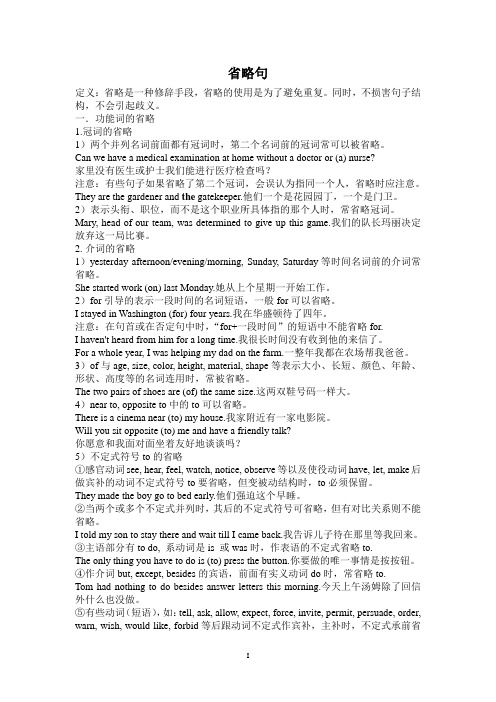
省略句定义:省略是一种修辞手段,省略的使用是为了避免重复。
同时,不损害句子结构,不会引起歧义。
一.功能词的省略1.冠词的省略1)两个并列名词前面都有冠词时,第二个名词前的冠词常可以被省略。
Can we have a medical examination at home without a doctor or (a) nurse?家里没有医生或护士我们能进行医疗检查吗?注意:有些句子如果省略了第二个冠词,会误认为指同一个人,省略时应注意。
They are the gardener and the gatekeeper.他们一个是花园园丁,一个是门卫。
2)表示头衔、职位,而不是这个职业所具体指的那个人时,常省略冠词。
Mary, head of our team, was determined to give up this game.我们的队长玛丽决定放弃这一局比赛。
2.介词的省略1)yesterday afternoon/evening/morning, Sunday, Saturday等时间名词前的介词常省略。
She started work (on) last Monday.她从上个星期一开始工作。
2)for引导的表示一段时间的名词短语,一般for可以省略。
I stayed in Washington (for) four years.我在华盛顿待了四年。
注意:在句首或在否定句中时,“for+一段时间”的短语中不能省略for.I haven't heard from him for a long time.我很长时间没有收到他的来信了。
For a whole year, I was helping my dad on the farm.一整年我都在农场帮我爸爸。
3)of与age, size, color, height, material, shape等表示大小、长短、颜色、年龄、形状、高度等的名词连用时,常被省略。
英语语法---省略
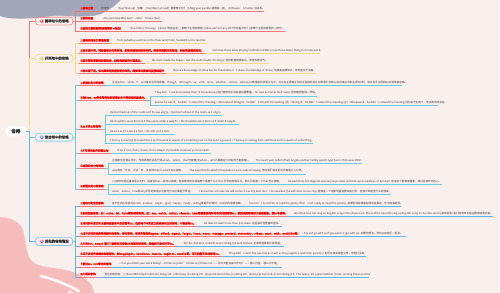
省略1简单句中的省略2并列句中的省略3复合句中的省略4其他的省略情况1.省略主语2.省略宾语3.省略主语和谓语(或谓语的一部分)1.动词不定式的省略2.某些使役动词,如:m a k e,le t,h a v e等和感官动词,如:see,w a t c h,no ti ce,o b ser v e,h ear等后⾯作宾补的不定式须省略t o,但若这些动词⽤于被动语态,则t o不省略。
3.并列的不定式可以省略后⾯的不定式符号t o。
但若两个不定式之间表⽰对⽐关系时,不能省略t o。
4.当不定式在某些动词后作宾语时,常可省略。
常⻅的动词有agree,a ff or d,e xp ec t,f orge t,h o p e,k no w,m anage,p re t en d,re m e mb er,re f use,w an t,wi s h,w oul d l ik e等。
5.介词b u t,e x ce pt (除了) 前有实义动词d o的某种形式时,后⾯的不定式不带t o。
6.当不定式作某些复合谓语时,如b e go i ng t o,b e a b le t o,h a v e t o,oug ht t o,use d t o等,可只保留不定式符号t o。
7.使⽤so,no t等时的省略8.介词的省略(Y ou co m e) Thi s w a y,p lease. 请这边⾛。
(省略了主语和谓语) (Ha v e y ou) G o t an y i n k? 你有墨⽔吗?(省略了主语和谓语的一部分)常⻅的结构有: (1)h a v e diffi cul ty/t rou b le (i n) d o i ng s th. (2)b e b us y (i n) d o i ng s th. (3)s p en d so m e tim e (i n) d o i ng s th. (4)s t o p/p re v en t s b. (f ro m) d o i ng s th. Th e h ea vy ra i n p re v en t e d him (f ro m) arr ivi ng th ere on tim e.—Can y ou fi n i s h y our w or k t o d a y? —I thi n k so./I d on’t thi n k so./I thi n k no t. ——你今天能完成⼯作吗? ——我认为能。
高中英语语法_省略

高中英语语法_省略高中英语语法:省略现象解析在英语语法中,省略是一种常见的语言现象。
它指的是在某些语境中,一些语言成分可以省略,而不会影响句子的完整性和理解。
省略现象主要出现在句子、从句或介词短语中。
本文将通过分析省略现象,帮助高中生更好地掌握英语语法。
一、句子的省略在英语中,省略句子成分是很常见的。
以下是一些常见的省略句子成分的情况:1、省略主语在某些情况下,句子可以省略主语,而不会影响句子的意思。
例如:(1)Sorry, I can't come. (我无法来。
)(2)Open the door, please. (请开门。
)2、省略谓语在一些简单句或祈使句中,谓语动词经常被省略。
例如:(1)Wash your hands before meals. (饭前要洗手。
)(2)Pick up the book on the floor. (把地上的书捡起来。
)3、省略宾语在一些简单句中,宾语可以省略。
例如:(1)She wants to buy a new dress. (她想买个新裙子。
)(2)I like eating fruits. (我喜欢吃水果。
)二、从句的省略在英语中,从句的省略现象也很常见。
以下是一些常见的从句省略情况:1、省略主语和谓语在定语从句中,如果主语和谓语与先行词一致,可以省略它们。
例如:(1)The man who is standing under the tree is my brother. (站在树下的那个男人是我的哥哥。
)(2)The book that you lent me is very interesting. (你借给我的那本书很有趣。
)2、省略作主语的代词和be动词在由that引导的定语从句中,作主语的代词和be动词通常可以省略。
例如:(1)The child (that) I taught is now a doctor. (我教过的那个孩子现在是一名医生。
高中英语语法省略句

shorter
2 Mr Smith picked up a coin in the road and Mr Smith
handed it to a policeman
省略共同的主语或宾语
3 Jack must have been playing football and Mary must
have been doing her homework
: –Are you an engineer – No; but I want tobe : –He hasn’t finished the task yet
–Well; he ought to have
Attention
使役动词及感官动词后面作宾语补足语的不定 式一定要省去to;但在被动语态中须将to复原
: The order that weshsohuoludld stay where we are is very serious and severe
: It’s very important that studentsshsohuoludld study hard at school
※介词的省略※考点
从句中有一些成分被省略 而用so或not来代替
: Are you leaving for Beijing this Sunday I think so so I’m leaving for Beijing this Sunday
: Tom must be free today If so;sohe can help us
4 同时省略几个成分
: Let’s meet at the same place aswe met
yesterday
同时省略主 谓语
高中英语语法之省略句
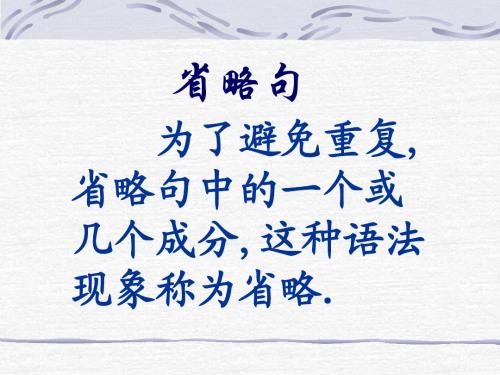
4.表示讲话人的意见和看法
(It) sounds fine to me. (It’s a) pity you couldn’t come.
5.提问
(Is there) anything wrong? (Have you) found the bike?
6.名词所有格修饰的名词若表示店铺,住 宅,教堂或上下文已暗示或明确指出过的 事物
省略句
为了避免重复, 省略句中的一个或 几个成分,这种语法 现象称为省略.
简单句中的省略
1.在对话中 --How is your mother today?
--(She is ) much better. 2.在祈使句中 (You) open the door,please. 3.在感叹句中 What a (good) boy (he is)! How (hard) they are working!
2)有时条件从句可以完全省去,只剩下主句。
3)以as,than 引导的比较状语从句可以全部或部分 省去。
I would have come yesterday (if I had wanted to).
After half a hour, she become quieter (than she had been.)
3.A computer does only what thinking people _________. (1999上海高考) A. have it do B. have it done C. have done it D. having it done
不定式在感官动词see, hear, feel, watch, notice, look at , listen to, overhear, observe 和使役动词 have, make, let 后 作宾语补足语时, 不定式省略to 。
语法中的省略现象
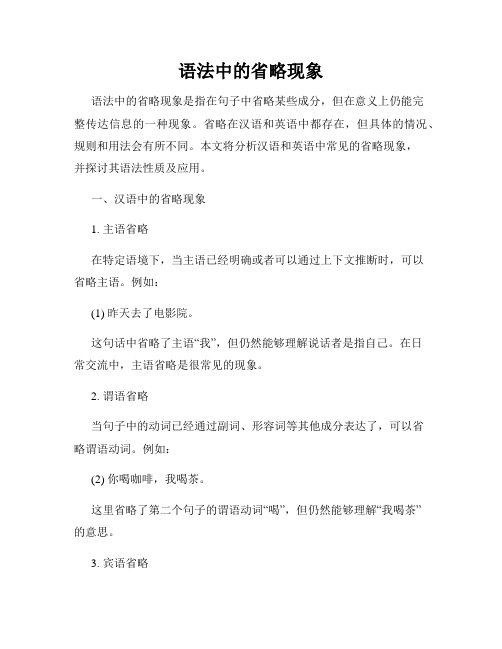
语法中的省略现象语法中的省略现象是指在句子中省略某些成分,但在意义上仍能完整传达信息的一种现象。
省略在汉语和英语中都存在,但具体的情况、规则和用法会有所不同。
本文将分析汉语和英语中常见的省略现象,并探讨其语法性质及应用。
一、汉语中的省略现象1. 主语省略在特定语境下,当主语已经明确或者可以通过上下文推断时,可以省略主语。
例如:(1) 昨天去了电影院。
这句话中省略了主语“我”,但仍然能够理解说话者是指自己。
在日常交流中,主语省略是很常见的现象。
2. 谓语省略当句子中的动词已经通过副词、形容词等其他成分表达了,可以省略谓语动词。
例如:(2) 你喝咖啡,我喝茶。
这里省略了第二个句子的谓语动词“喝”,但仍然能够理解“我喝茶”的意思。
3. 宾语省略当宾语已经通过上下文或者句子中的其他成分明确指出时,可以省略宾语。
例如:(3) 小明擅长弹吉他,小红擅长弹钢琴。
这里省略了第二个句子中的宾语“钢琴”,但读者能够根据上下文理解。
4. 状语省略一些状语在特定语境下也可以省略。
例如:(4) 我明天打篮球,你后天打。
这里省略了第二个句子中的状语“篮球”,但仍然能够理解说话者的意图。
二、英语中的省略现象1. 主语省略与汉语类似,当主语已经明确或者可以通过上下文推断时,可以省略主语。
例如:(5) Are you coming to the party? Yes, I am.这里省略了第二句的主语“I”,但读者能够根据上下文理解。
2. 谓语省略在英语中,当句子中已经有了助动词或情态动词时,可以省略实义动词。
例如:(6) I can swim, but she can't.这里省略了第二个句子中的实义动词“swim”,但读者能够理解其意思。
3. 宾语省略在英语中,有时可以省略宾语,前提是宾语在上下文中已经明确。
例如:(7) I like jazz music, and she classical.这里省略了第二个句子中的宾语“classical music”,但读者能够根据上下文推断。
高中英语语法——省略句

【注意】 (1)在when, if, what, as 引导的从句中,want, like后的
不定式符号to常省略,如:
You can go and play football if you want.
(2)be able to, be going to, have to, ought to, used to等后 面不定式动词若与前面的动词相同,则其后的动词 常被省略,只留下不定式符号to,如:
规则2:省略状语 当表示在同一个地方所发生的事情时,则将其中一 个分句的状语省略,如:
(3)He was born and died in that house.
3. 状语从句中的省略 (1) When (she was) asked, she didn't answer a word.
(2) He likes dogs more than cats.
• The students want to enter the lab, but the monitor advises them not to.
(4)在“系动词(be)+ 形容词”,即“be afraid / ready / glad / happy / willing”等后面接不定式,为了避免 重复,常省略与上文相同的动词,只保留不定式符 号to,如:— Could you go shopping with me? — I'm glad to (go shopping with you).
(1)I consider him stupid. 规则2:小品词to的省略 (1)在see, watch, hear, feel, observe, notice, look at, listen
to等感观动词及使役动词let, make, have 后的“宾语 + 动词不定式作宾语补足语”的结构中,不定式符 号to须省略,但这类结构变成被动语态时,其后的 不定式要还原加上to。
高考英语语法省略与替代
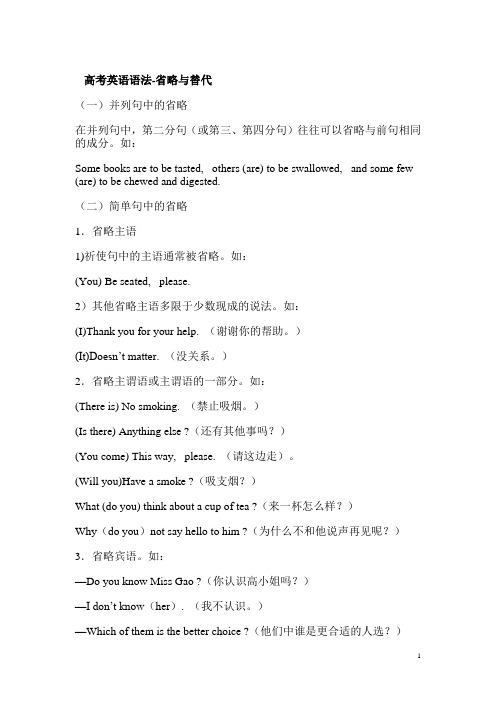
高考英语语法-省略与替代(一)并列句中的省略在并列句中,第二分句(或第三、第四分句)往往可以省略与前句相同的成分。
如:Some books are to be tasted, others (are) to be swallowed, and some few (are) to be chewed and digested.(二)简单句中的省略1.省略主语1)祈使句中的主语通常被省略。
如:(You) Be seated, please.2)其他省略主语多限于少数现成的说法。
如:(I)Thank you for your help. (谢谢你的帮助。
)(It)Doesn’t matter. (没关系。
)2.省略主谓语或主谓语的一部分。
如:(There is) No smoking. (禁止吸烟。
)(Is there) Anything else ?(还有其他事吗?)(You come) This way, please. (请这边走)。
(Will you)Have a smoke ?(吸支烟?)What (do you) think about a cup of tea ?(来一杯怎么样?)Why(do you)not say hello to him ?(为什么不和他说声再见呢?)3.省略宾语。
如:—Do you know Miss Gao ?(你认识高小姐吗?)—I don’t know(her). (我不认识。
)—Which of them is the better choice ?(他们中谁是更合适的人选?)—Well, it’s hard to tell(it). (哟,这很难说。
)4.省略表语。
如:—Are you thirsty ?(你渴吗?)—Yes, I am(thirsty). (是的,我渴。
)5.同时省略几个成分。
如:—Are you feeling better now ?(你觉得好些吗?)—(I am feeling)Much better(now). (好多了。
高中英语语法——省略(53张PPT)

You arrived earlier than necessary.
it was
Puccini wrote Turandot and (he also wrote) Madam Butterfly.
We can use ellipsis in two parts with the same pattern and the same verb.
Circle the words you could cross out (勾掉,划掉)and read again
and you will find that the
language would be more concise (简洁的).
Answers A Jane: How did you feel taking part in Turandot? Singer: It was a real opportunity for me to be cast. It had always been one of my strongest desires to have a part in Turandot. Jane: How were you hired for the job? Singer: Well, I’m a musical performer, but there was a short period when I was not working, and was just collecting unemployment benefits. One day, I saw a poster put up by the production company’s Personnel Department, saying they were looking for singers.
高中英语语法之省略
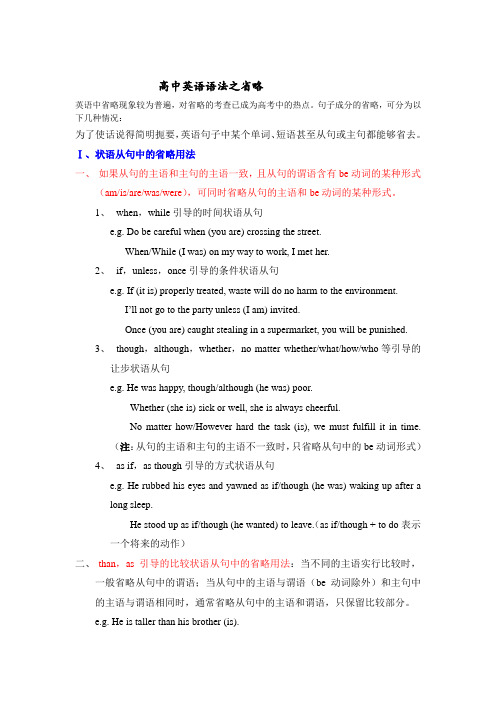
高中英语语法之省略英语中省略现象较为普遍,对省略的考查已成为高考中的热点。
句子成分的省略,可分为以下几种情况:为了使话说得简明扼要,英语句子中某个单词、短语甚至从句或主句都能够省去。
Ⅰ、状语从句中的省略用法一、如果从句的主语和主句的主语一致,且从句的谓语含有be动词的某种形式(am/is/are/was/were),可同时省略从句的主语和be动词的某种形式。
1、when,while引导的时间状语从句e.g. Do be careful when (you are) crossing the street.When/While (I was) on my way to work, I met her.2、if,unless,once引导的条件状语从句e.g. If (it is) properly treated, waste will do no harm to the environment.I’ll not go to the party unless (I am) invited.Once (you are) caught stealing in a supermarket, you will be punished.3、though,although,whether,no matter whether/what/how/who等引导的让步状语从句e.g. He was happy, though/although (he was) poor.Whether (she is) sick or well, she is always cheerful.No matter how/However hard the task (is), we must fulfill it in time.(注:从句的主语和主句的主语不一致时,只省略从句中的be动词形式)4、as if,as though引导的方式状语从句e.g. He rubbed his eyes and yawned as if/though (he was) waking up after along sleep.He stood up as if/though (he wanted) to leave.(as if/though + to do表示一个将来的动作)二、than,as引导的比较状语从句中的省略用法:当不同的主语实行比较时,一般省略从句中的谓语;当从句中的主语与谓语(be动词除外)和主句中的主语与谓语相同时,通常省略从句中的主语和谓语,只保留比较部分。
高中英语语法 省略

(3)在as(so)... as..., than引导的比较状语从句中。
I know you can do better than Peter.
II)定语从句中的省略
(1)在限制性定语从句中,作宾语的关系代词that, which, who (whom)常可以省略。
The man I saw is called Tom.
Where is the pen I bought this morning?
(2)关系副词when, where, why及that在the time when, the place where, the reason
wonder) that...等主语从句中。
It is necessary that the problem be solved at once.
(5)有时也可以根据说话的情景来省略主句中的一些成分。
Sorry I've kept you waiting so long.
They may go if they wish to.
Don't go till I tell you to.
9)动词不定式在ask,warn,tell,advise,force,wish,expect,allow,permit , invite, persuade, order, would like, forbid等动词后作宾语补足语或主语补足语时,常可省略。
一、简单句中的省略
1)感叹句中常省略主语和谓语。
What a hot day (it is)!
初中英语语法 什么是代词的省略
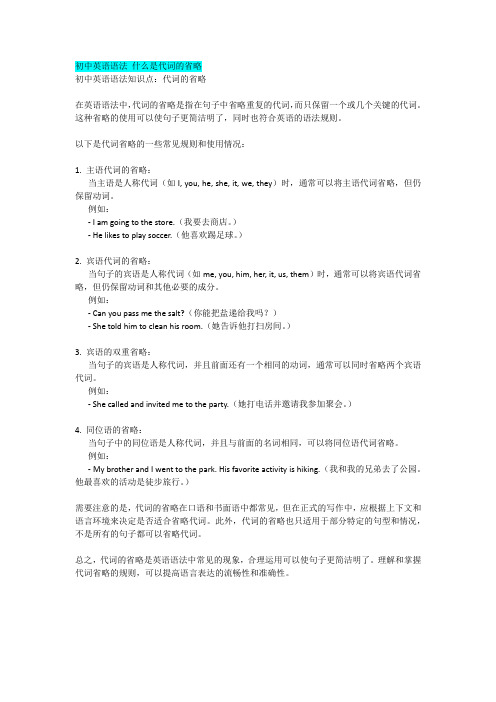
初中英语语法什么是代词的省略初中英语语法知识点:代词的省略在英语语法中,代词的省略是指在句子中省略重复的代词,而只保留一个或几个关键的代词。
这种省略的使用可以使句子更简洁明了,同时也符合英语的语法规则。
以下是代词省略的一些常见规则和使用情况:1. 主语代词的省略:当主语是人称代词(如I, you, he, she, it, we, they)时,通常可以将主语代词省略,但仍保留动词。
例如:- I am going to the store.(我要去商店。
)- He likes to play soccer.(他喜欢踢足球。
)2. 宾语代词的省略:当句子的宾语是人称代词(如me, you, him, her, it, us, them)时,通常可以将宾语代词省略,但仍保留动词和其他必要的成分。
例如:- Can you pass me the salt?(你能把盐递给我吗?)- She told him to clean his room.(她告诉他打扫房间。
)3. 宾语的双重省略:当句子的宾语是人称代词,并且前面还有一个相同的动词,通常可以同时省略两个宾语代词。
例如:- She called and invited me to the party.(她打电话并邀请我参加聚会。
)4. 同位语的省略:当句子中的同位语是人称代词,并且与前面的名词相同,可以将同位语代词省略。
例如:- My brother and I went to the park. His favorite activity is hiking.(我和我的兄弟去了公园。
他最喜欢的活动是徒步旅行。
)需要注意的是,代词的省略在口语和书面语中都常见,但在正式的写作中,应根据上下文和语言环境来决定是否适合省略代词。
此外,代词的省略也只适用于部分特定的句型和情况,不是所有的句子都可以省略代词。
总之,代词的省略是英语语法中常见的现象,合理运用可以使句子更简洁明了。
- 1、下载文档前请自行甄别文档内容的完整性,平台不提供额外的编辑、内容补充、找答案等附加服务。
- 2、"仅部分预览"的文档,不可在线预览部分如存在完整性等问题,可反馈申请退款(可完整预览的文档不适用该条件!)。
- 3、如文档侵犯您的权益,请联系客服反馈,我们会尽快为您处理(人工客服工作时间:9:00-18:30)。
I. 句首省略:在非正式谈话中,如果意思 清楚,句首的非重读词语常常省略。 可以省略的词包括冠词a/an, the、物 主代词 my, your等、人称代词I , you等、助动词 am, have等、和 there be句型中的there。例如:
4) 在would like/ love/ hate/ prefer, want和choose后面通常不能省略to:
1. ---Are you interested in going to university? ---I’d like to. 2. Her parents encouraged her to study art, but she didn’t want to. 然而当want 和like用于从句中时,to常略: 1. Come when you want.
2) 在than或as引起的从句中的省略: 如果意思清楚,as和 than后的词可省略: • Many others are doing better than we are. • He works harder than ever. • They will try to put the plan into practice as soon as possible.
出现在并列句中的be, have, do,如果在 一个分句中作助动词,而在另一个分 句中作行为动词,则不可省略: 1. The man has a gun and has threatened to use it. 2. Mary did the work but did not finish it. 并列句的省略有时还可出现在前面的分 句中,这时被省略的词语便出现在下文: George will (take the course) and Bob might take the course.
4) 在限定性定语从句中作宾语的关系代 词可以省略: 1. What do you think of the film we saw last night? 2. She is somebody I really can’t tolerate.
X if anything, if any, if ever, if so, if not
III. 介词的省略 1)在以next, last, this, that, these, those, one, every, each, some, any, all等开始的一些表示时间的常 用词组前面以及tomorrow morning, yesterday afternoon前面,不用介 词: 1. See you next Saturday. 2. I’ll never forget meeting you that afternoon. 3. We met one Tuesday in August. 4. Come any day you like. 5. The party lasted all night.
7) 在非正式文体中,与place连用的一 些词组里,to可以省略: 1. Let’s go some place where it’s quiet. 2. He doesn’t have money to go places.
在非正式文体中,在place, day, way, time+不 定式+介词结构中,可省略介词: 1. They need a place to live (in). 2. She has no place to go (to). 3. I can't think of a worse way to spend my time.
II. 答语的省略
答语在语法上经常不完整,因为不需要重复刚 才说过的话。 1. ---Have you finished your composition? ---Not yet. 2. ---Linda has arrived. ---when? 3. ---He won’t go to the party. ---why not?
2. I have decided to do what I like.
•
注意:如果不定式为to be和to have “有”, 时,则不能省略。如: 1. He has not been promoted yet, but she ought to be. 2. You have got more challenges than you used to have. 3. Are you a sailor? No, but I used to be.
1) if anything在比较结构中,表示“如果有 区别的话”;还可表示“如果有……的 话”;另一含义是:“相反,反而”: 1.The carriages of German state railways are, if anything, better than those of the large French companies. 2. True greatness has little, if anything, to do with rank or power. 3. Your suggestion could only make things worse if anything.
IV.不定式的省略
1)如果意思清楚的话,可以用to代替整 个不定式: 1. I went there because I want to. 2. ---will you join us? ---Yes I’d love to.
2)在and 或or连接的不定式并列结构中,第 二个不定式的to通常省去。如: • I will ask them to come over and talk the matter over.
V.并列成分和并列句中的省略现象 当用and, but或or连接词语和句子时,常可省略 各种重复的词: 1. a knife and (a) fork; 2. in France, Germany or Spain 3. His office was on the tenth floor, and hers (office was) on the twelfth (floor). 4. I’ll buy a house. He will (buy a house) too. 5. John was the winner in1994, and Bob (was the winner) in 1995. 6. She can read, but can’t write.
3)在某些动词后可省略整个动词不定 式。这种情况常出现在名词和形容词 以及try后:
1. ---Can you start the car?
---Ok, I will try. 2. You can’t force him to get a job if he is not ready (to). 3. He’ll never leave home; he hasn’t got the nerve (to).
2)在非正式文体中,尤其在美国,一周七天 前面的on有时省略:
• And see you Monday. 3)在非正式文体中,在about +时间词组 前面at经常省略: • I’ll see you about 3 o’clock. 4) 在非正式文体中,表示某事维持多长 时间的词组里,for常省略: • We have lived here (for) ten years.
2) 在somewhere, anywhere, everywhere, nowhere和place后,常 用that代替where, 或者省略: 1. Have you got anywhere (that) I can lie down for a while? 2. We need a place (that) we can stay for a few days.
VII. 引导宾语从句的连词以及形容词后面的 that通常都可省略。 • I hope (that) all will go well. • We were surprised (that) he came. 但如果从句较长或从句的语境较复杂, 连词 that 不能省略: 1. She has made it clear that she will have nothing to do with him. 2. Everybody could see what an important person he was, and that they ought to be careful not to offend him.
在简略答语中,如果句子无动词,要用宾格 代词作主语,而不用主格代词: 1. ---Who wants a ride in my car? ---Me!/ Not me! 2. ---I hear you’re a professor. ---Me a professor! 3. ---I really want to have a good sleep. ---Me, too.
IX. 定语从句中的省略 1) 省略关系副词where, why, when和 关系代词。在指时间的普通名词后, 在非正式文体中when经常用that代 替或省去:
1. Come and see us any time (that) you’re in town. 2. I’ll never forget the day (that) I had my ankle sprained. 3. That was the year (that) he first went abroad.
